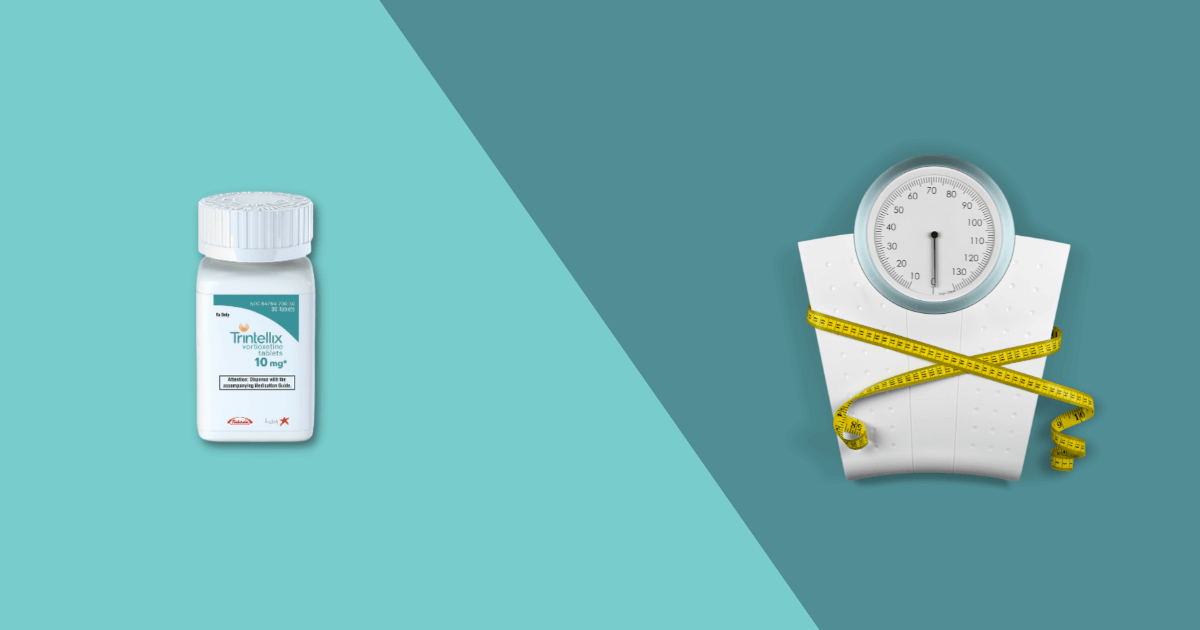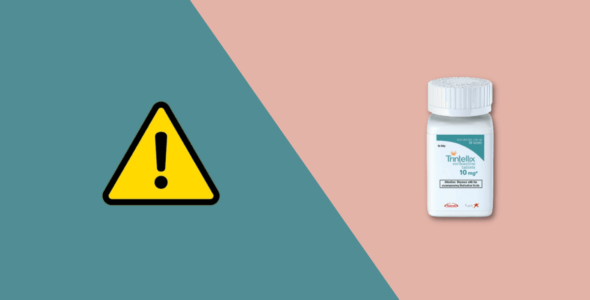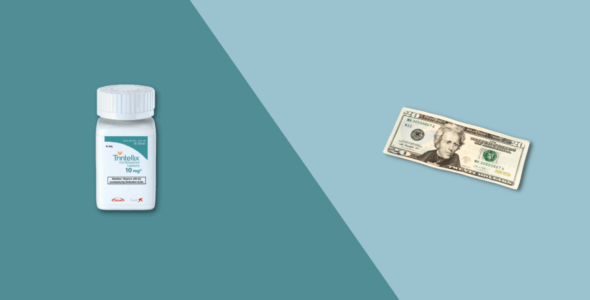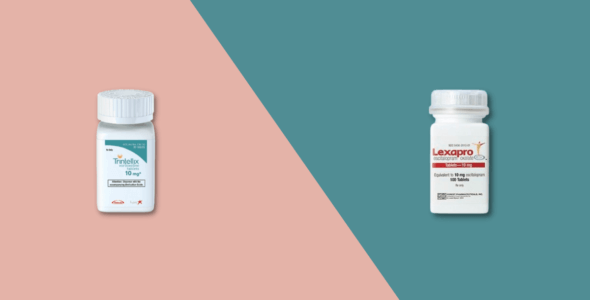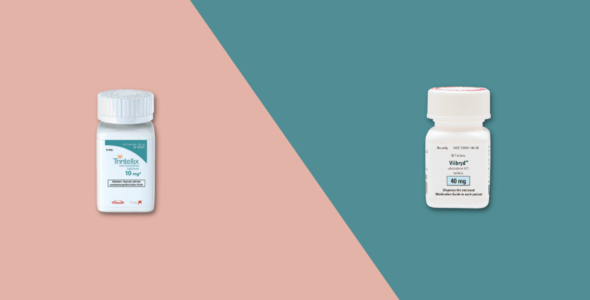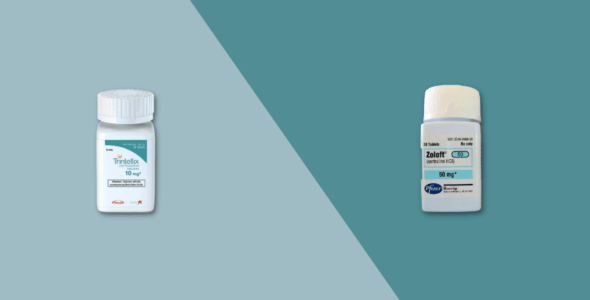Does Trintellix cause weight gain?
Key highlights
- According to the drug manufacturer, Trintellix did not cause any significant change in body weight during short-term clinical studies or during a 6-month phase of a long-term study.
- Since Trintellix has come out on the market, there have been reports of weight gain, although it is unclear how often this occurs or if Trintellix was the cause of the weight gain.
- Weight gain seems to be a rare occurrence with Trintellix, especially when compared to these other medications used to treat depressive symptoms.
- Depression itself can make gain weight by causing you to overeat, make poor diet choices, and keep you unmotivated to exercise.
Table of contents
- What is Trintellix (vortioxetine)?
- Does Trintellix cause weight gain?
- What are the pros and cons of Trintellix?
- How do you take Trintellix?
- What should you tell your doctor before starting Trintellix?
- What are the most common side effects of Trintellix?
- How much does Trintellix cost?
- Why is Trintellix so expensive?
- How long does it take Trintellix to work?
- Does Trintellix make you retain water?
More than 1 in 10 Americans take antidepressant drugs to treat depression. Like all medications, antidepressants such as Trintellix have side effects that can affect some, but not all people.
Weight gain is a possible side effect of many antidepressants. Weight change (weight gain or weight loss) is common in people with depression and other mood disorders even if they are not taking an antidepressant.
Keep reading as we discuss Trintellix and what effect it can have on your weight.
What is Trintellix (vortioxetine)?
Trintellix is an antidepressant medication that can be considered a serotonin modulator and stimulator. Trintellix was previously marketed under the brand name Brintellix but the manufacturer changed the name in 2016 after there was confusion between Brintellix and a prescription medication for the heart called Brilinta. Trintellix is FDA-approved to treat major depressive disorder (MDD) in adults.
The exact mechanism of action of Trintellix in the treatment of depression is not known but is thought to be due to its serotonergic activity and inhibition of the serotonin transporter, a mechanism similar to the selective serotonin reuptake inhibitors (SSRIs) such as Celexa (citalopram), Lexapro (escitalopram), Zoloft (sertraline), and Prozac (fluoxetine).
Trintellix is an oral tablet that is typically taken once a day. It is available in strengths of 5mg, 10mg, and 20 mg.
RELATED: What is Trintellix
Does Trintellix cause weight gain?
According to the drug manufacturer, Trintellix did not cause any significant change in body weight during short-term clinical studies or during a 6-month phase of a long-term study of patients who responded to Trintellix when compared to patients taking a placebo. However, since it has come out on the market, there have been reports of weight gain. It should be noted that it is unclear how often this occurs or if Trintellix was the cause of the weight gain.
If Trintellix is the cause, it may be due to Trintellix increasing your appetite or because it has altered your hormones or metabolism. Weight gain seems to be a rare occurrence with Trintellix, especially when compared to these other medications used to treat depressive symptoms due to mental health disorders, including:
- Tricyclic antidepressants (TCAs) such as Elavil (amitriptyline), Tofranil (imipramine), and Sinequan (doxepin)
- Monoamine oxidase inhibitors (MAOIs), such as Nardil (phenelzine)
- Selective serotonin reuptake inhibitors (SSRIs) such as Zoloft (sertraline) and Paxil (paroxetine)
- Atypical antidepressants such as Remeron (mirtazapine)
Other antidepressants that have been associated with less weight gain than those mentioned above, include Trintellix as well as:
- Serotonin-norepinephrine reuptake inhibitors (SNRIs) such as Cymbalta (duloxetine), Effexor (venlafaxine), Pristiq (desvenlafaxine), and Fetzima (levomilnacipran)
- Wellbutrin (bupropion), an atypical antidepressant
- Lexapro (citalopram), an SSRI
- Serzone (nefazodone), an SSRI/antagonist
- Viibryd (vilazodone), an SSRI/5HT-1A partial agonist
Just because you gain weight after starting an antidepressant, it does not mean it is an adverse effect of the medication. There are other factors that may contribute to you gaining weight after being prescribed an antidepressant such as Trintellix.
Depression itself can make gain weight by causing you to overeat, make poor diet choices, and keep you unmotivated to exercise. Depression can cause some people to have a decreased appetite, leading to weight loss. Starting an antidepressant can help improve your mood which can increase your appetite and result in weight gain.
Adults typically gain weight as they age, no matter what medications they are taking. Weight gain could also be due to bloating, constipation, or social eating.
What are the pros and cons of Trintellix?
If your prescribing physician has given you Trintellix to treat your depression, it is important to weigh the pros and cons of using this medication.
Pros
- Trintellix is an oral tablet that you only have to take once a day
- Is as effective and safe as SSRIs
- May cause less sexual dysfunction and weight gain when compared to other medications for depression
- Can be used when you have failed other antidepressants
- May start to work faster than other typical antidepressants
Cons
- Like other antidepressants, Trintellix may increase the risk of suicidal thoughts in patients under 24 years of age
- It tends to cause nausea more frequently than other antidepressants
- It can cause serotonin syndrome (agitation, rapid heartbeat, change in blood pressure, dizziness, fever, muscle stiffness, sweating, nausea, and vomiting) especially if it is combined with other medications or supplements that increase serotonin
- Trintellix increases your risk of bleeding problems and low sodium (hyponatremia)
- This medication may worsen mania symptoms or activate mania/hypomania if you have bipolar disorder
How do you take Trintellix?
Trintellix is an oral tablet that is typically taken once a day. You can take this medication with or without food. Make sure you take Trintellix exactly as your healthcare provider tells you to. Do not change your dose or stop taking this medication without talking with them first.
What should you tell your doctor before starting Trintellix?
Before taking Trintellix, be sure your doctor is aware of all your medical conditions, including:
- History of seizures or convulsions
- Bleeding disorder or are currently taking blood thinners such as Coumadin (warfarin)
- Personal or family history of bipolar disorder, mania, or hypomania
- Have low sodium levels
- Glaucoma
- Are pregnant or plan on becoming pregnant as Trintellix may harm your unborn baby
- Are breastfeeding or plan to breastfeed
What are the most common side effects of Trintellix?
The most common side effects of Trintellix seen in clinical trials include:
- Nausea
- Vomiting
- Constipation
- Diarrhea
- Fatigue
- Dizziness
- Dry mouth
- Gas
- Abnormal dreams
Trintellix can sometimes cause serious side effects such as:
- Serious hypersensitivity reactions, including anaphylaxis
- Increased risk of suicidal thoughts and behaviors
- Serotonin syndrome
- Sexual side effects, including erectile dysfunction
- Very low sodium levels
Speak with your healthcare provider about the possible drug interactions with any other prescription drugs, over-the-counter products, vitamins, and supplements you are taking. These are not all of the possible side effects of Trintellix. You should always seek medical advice for any questions or concerns relating to your medical condition or treatment. You can report side effects to FDA at 1-800-FDA-1088 or www.fda.gov/medwatch.
RELATED: Trintellix side effects and how to avoid them
How much does Trintellix cost?
The estimated cost for #30 Trintellix 10mg tablets (30-day supply) is over $525 without insurance.
Why is Trintellix so expensive?
Brand-name medications such as Trintellix are typically more expensive because of the high costs to develop, market, and sell brand-new drugs. The drug companies that develop new medications will have a patent on them. This gives them the exclusive right to sell that medication. With no competition from generics, drug companies charge whatever the market will allow, maximizing their profits. The patents for Trintellix will expire in June 2027, which is the earliest date a generic pharmaceutical company will be able to apply for FDA authorization to sell a generic version of Trintellix.
RELATED: Why is Trintellix so expensive?
How long does it take Trintellix to work?
In short-term studies that lasted 6 to 8 weeks, patients started seeing the therapeutic effect of Trintellix in week 2 of treatment. The full effects of Trintellix are not typically seen until week 4 or later.
Does Trintellix make you retain water?
For some people who take Trintellix, it can cause them to have low sodium levels in their blood. Low sodium levels may be due to them retaining water and diluting the concentration of sodium. For those on Trintellix, it is typically due to fluid retention caused by the syndrome of inappropriate antidiuretic hormone secretion (SIADH). Elderly patients over the age of 65 and those taking diuretics are at an increased risk of this side effect.
Medically reviewed
A medical professional has reviewed this article.


Jamie Winn, PharmD
Jamie Winn, PharmD
Dr. Jamie Winn received his Doctor of Pharmacy in 2002 from the University of South Carolina College of Pharmacy, Columbia, SC. Jamie is a medical reviewer for NiceRx.

